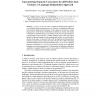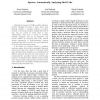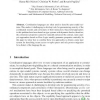3653 search results - page 28 / 731 » Analyzing language development from a network approach |
100
Voted
BMCBI
2010
14 years 10 months ago
2010
Background: A growing demand for tools to assist the building and analysis of biological networks exists in systems biology. We argue that the use of a formal approach is relevant...
92
Voted
TOOLS
2009
IEEE
15 years 5 months ago
2009
IEEE
A software product line (SPL) is a family of related program variants in a well-defined domain, generated from a set of features. A fundamental difference from classical applicati...
80
Voted
ACSAC
2007
IEEE
15 years 4 months ago
2007
IEEE
Detecting the presence of buffer overflow attacks in network messages has been a major focus. Only knowing whether a message contains an attack, however, is not always enough to m...
94
Voted
UAIS
2008
14 years 10 months ago
2008
Abstract Research in the field of sign language recognition has made significant advances in recent years. The present achievements provide the basis for future applications with t...
90
Voted
COORDINATION
2008
Springer
15 years 2 days ago
2008
Springer
Abstract. Coordination languages are often used to describe open ended systems. This makes it challenging to develop tools for guaranteeing security of the coordinated systems and ...



